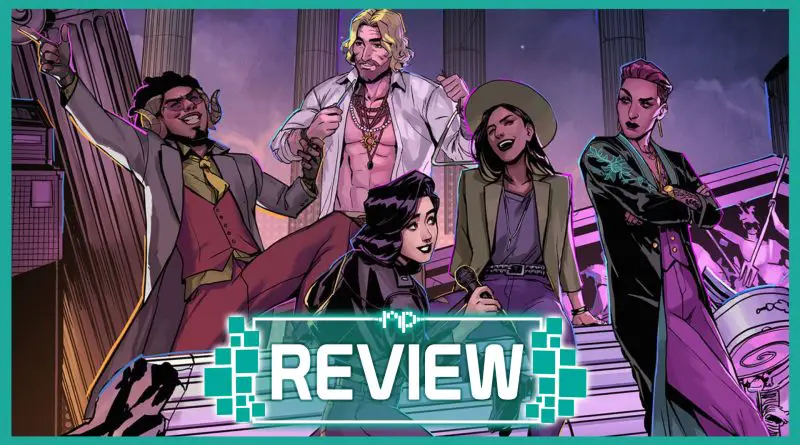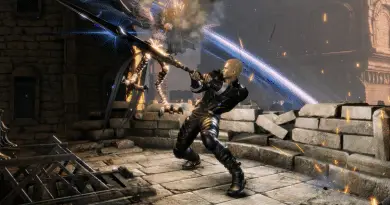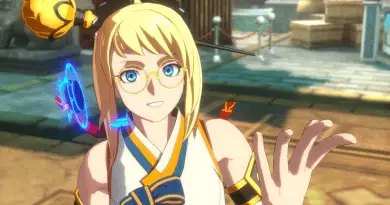Stray Gods: The Roleplaying Musical Review – You’ve Never Seen Idols Like This Before
-
Title: Stray Gods: The Roleplaying Musical
Developer: Summerfall Studios
Release Date: August 10, 2023
-
Reviewed On: PC
Publisher: Humble Games
Genre: Adventure
Every once in a while, I come across a title that makes me question whether it even really fits into the category of “game.” Stray Gods’ demo made it very clear that it would be one of those projects, being more of an interactive movie, but I was drawn fully into its world despite its unusual presentation. How would this story play out in full? What would it take to see everything? Was everyone going to be this hot? I needed the answers, and now that I have them, I think I can finally talk about this experience and who I would and wouldn’t recommend it to.
As a quick refresher, Stray Gods is an adventure-ish game about a woman named Grace who suddenly inherits the power of a Greek Muse, the ability to make people reveal truths and emotions through song. She has a week to use this power to solve the murder of the previous Muse, who died in her arms – making her suspect number one. If she doesn’t clear her name, she will be executed as a usurper and murderer, so it’s up to her to navigate the new world she finds herself in, make allies, and figure out whodunnit.
Each scene plays out through a series of dialogue trees and choices. If these look familiar, it’s because the game was written by David Gaider, best known for being the previous lead writer on both the Dragon Age and Knights of the Old Republic series for BioWare. This alone sets expectations sky-high, but we’ll return to my thoughts on how the player’s choices affected my experience. Thankfully, the game is highly evident on which dialogue options are specifically exposition scenes, which ones move the scene along, and which ones actually affect the story, so you don’t need to worry about accidentally doing something you didn’t mean to.
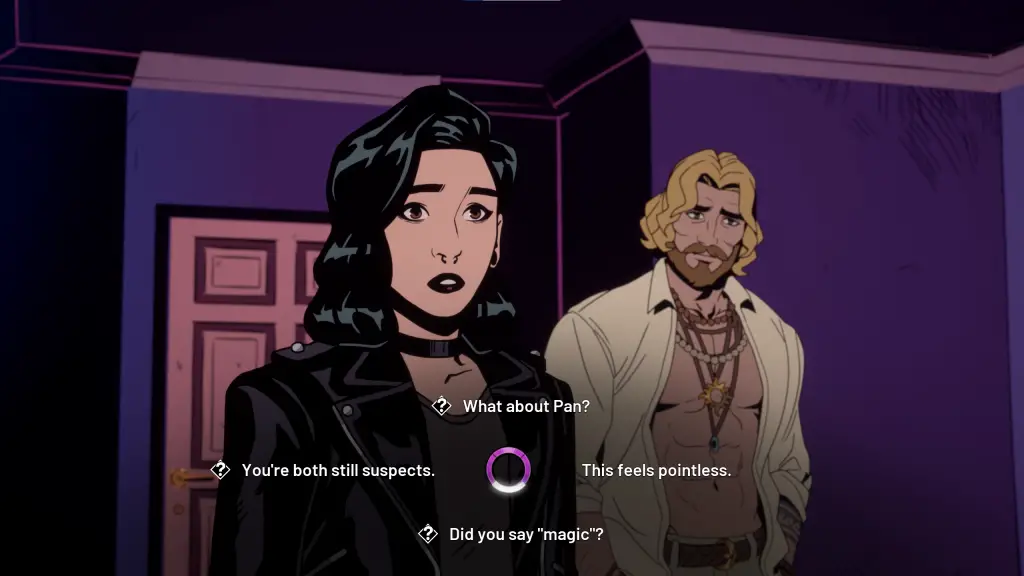
Of course, most of these scenes also have musical numbers in them, as Grace uses her power to befriend other gods, work out information, and solve problems she encounters, and this is where we get into the performances. Firstly, the game’s cast is ridiculously stacked – this game stars probably the three most famous video game voice actors in the world, with Laura Bailey as Grace, Troy Baker as Apollo, Ashley Johnson as Calliope and A-list talent filling up the rest of the ranks. The dialogue scenes feel like they were directed to get the most natural-sounding performances possible, taking advantage of the static character portraits. Despite the lack of movement on-screen, the audio direction makes the game a thoroughly immersive experience.
As for the songs, well, I wouldn’t say anybody does badly by any means, but the music is somewhat lacking in the finesse I would expect in a staged musical. Stray Gods was heavily inspired by Once More, With Feeling, the musical episode of Buffy the Vampire Slayer that influenced many other TV shows of the last twenty years to feature musical episodes. That goes a long way to explain why the musical numbers are pleasant but mainly exist to move the story along. Still, it is somewhat noticeable that some of the performers have a vast range and more training than others – the only Broadway-famous actor on the cast, Anthony Rapp, appears in just one scene as Orpheus, which I would consider a bit of a waste.
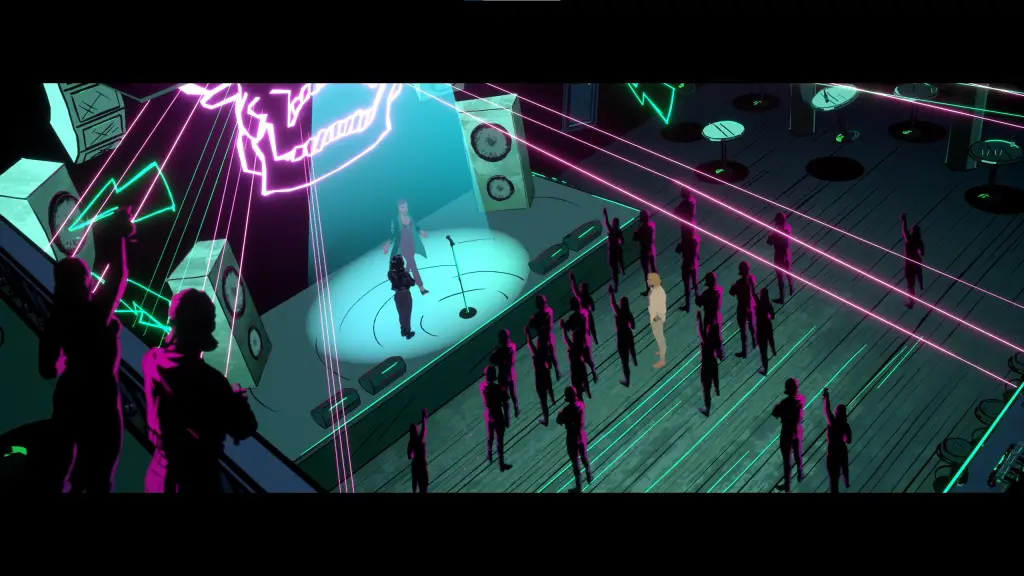
Stray Gods generally makes the musical numbers work by focusing them more on plot progression than vocal showcasing, and the choice-making does not stop during the songs. The player is offered three main paths to take through the game but is not locked into them. While a choice at the beginning will explain the general ideas of the colored paths to you, as far as I could tell, none of the actual decisions were locked behind them, but you do get bonus dialogue options for them. The soundtracks for the game take this into account, with one for each colored path assuming the player picks the same color each time and one with a mix of the three.
My real issue here is how much the player can actually influence the story beats, which I suppose is thematically relevant given the presence of the Greek gods. I was led for most of the game to believe that my actions would seriously affect things down the line, but – just as an example – the choice early on that was present in the demo of whether to ally yourself with Grace’s best friend Freddie or trickster god Pan, didn’t seem to affect very many of the scenes that followed it. I was even more unsure later on when a visit to the Underworld was triggered by something I assumed came out of my choices, but it came with a plot-important reveal that made me think I would have been led here regardless.
I’m also not overly satisfied with how the story wraps up – things turn out a little too neatly and abruptly for my taste, and some of the offscreen beats in the epilogue left me scratching my head trying to work out leaps in logic. The story is beautiful, tragic, and well-told, but the final act left me thinking, “Wait…that’s it?”.

Stray Gods is, as I expected, a game that will appeal to a particular crowd who will likely protect it fiercely but be difficult to explain to a broader majority. It’s best examined as more of an interactive film starring some of gaming’s best talent rather than a video game itself. With that in mind, the story is engrossing and emotional, the music pulls you even deeper into the world, and the presentation makes a lot out of a limited asset pool. If this looks like your idea of a good time, it definitely will be, and I encourage you to turn out the lights, put on your headphones, and let it wash you away.
This post may contain Amazon affiliate links. As an Amazon Associate Noisy Pixel earns from qualifying purchases.
